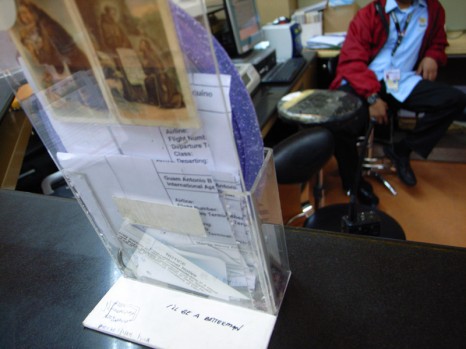 transfers desk, Ninoy Aquino International, 2011
transfers desk, Ninoy Aquino International, 2011
realistically speaking
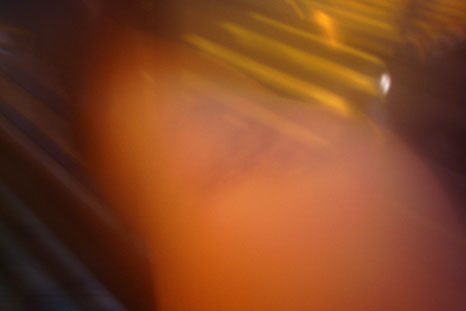
You spoke of the beginnings of a new metaphor with which we should look at our present condition, like living in Beijing, realistically. Our metaphors come from bicycle encounters and the emotional outcroppings of the everyday. at the time i could only see flesh as a gliding, swerving in and around vehicles, going without cutting corners. We laughed about the flows.
The flesh as meat——not as skin, as I had previously so imagined——is a space of tightness, of form and intimacy and movement as a squeezing of space. Skin as a gliding over and around, all options open except that one moves merely as a compatriot of gravity, touching, just going. Where do we look, realistically, while on our bicycles, in encounter? Nobody cares. Movement is a question of whomever may 让 first, usually predicated upon size. But let us enlarge our frame of view. To examine our reality here is a fleshy matter, full of scars and circumstance. Situationism could be given, rather, a form of agency. Adjacency. Victorious life proposes a next-to. If we were to give up subjectivity and objectivity, can movement presume, ex-stasis? Flow is always a making up of what came before, along the lines of a scar, reaction and healing. Let us make up for imperial autocracy, let us make up for capitalist pigs, let us make up for the sick yellow man! And so we are stuck in a striving or a being, reactionary.
But Vitanza’s scar is a middle place between flesh and skin, along surfaces and imbedded within. Realistically, we find ourselves covering over, working through, both as a form of being and of representation, as spectators and actors, as lifeforms headed inevitably towards death. Is such certainty a place of flesh or of skin? We fall asleep with the TV, we learn to love and hate our lovers. This affect is of flesh and skin, multidirectional, surfaces and interiors all at once.
Scar as both a place and temporality, a contextification. It is the grounding memory of affect, a node upon the flow of the body, or movement ex-stasis. Flashbacks of life in times of death should tear our bodies from such ecstasies; these are the groundings we can never break away from, realistically.
I slipped and hurt myself today, on or off cycles, wet pavement. In the midst of mutual shock, she snapped at me. I’m sorry, I said.
…in the sign of the scar—where foreground and background collapse—negotiating between life and death, skin and scar, public and private, I will hallucinate on a series of cultural objects that would provide us with exemplary ways of “living on” in the scar of the sign as Dasein. But as I do that, note that I do that semiotically across the images being unfolded over there. Da Sein. But. Of Sign. The episode of “Scar Tissue.” I am trying to situate myselves, through a series of interruptions, corruptions, eruptions, between over there and here. Becoming be-tween. Ec-static. Perhaps after a while you, too, will situate yourselves in between there and here.
–Victor Vitanza, “Design as Dasein”: Scar, … to be accompanied by video
Posted by 丫 | more »treatise on the university of disaster
I had no idea what he was talking about, really. Reverberations pass away easily, behind the ears, at pressure points, when cooking. Roles are performed in adequate fashion, resulting in countering feelings of inadequacy, words flow, nothing is communicated. The treatise is about performance, perhaps. Insinuation of a guise, this is not real, whichever how you really feel. No, really. Keeping it real.
Had no idea what i was talking about really. Sometimes the emotions would arise, and one would find oneself unable to act appropriately, a subjective propriety, a nicety. Trying not to look too hard at his pimples. The palimpsest of his pimples, because even thirty-somethings get them, oh yes, renewal, we can feel like teenagers again and again and over again.
Your postmaturity, maybe. Treatises that we haven’t written yet, half-thoughts, names dropped, another drifting off on the bus again. No, there. When the girl with the ponytail steps on my foot in the bus, I notice her, her captivated audience of fellow passengers, a spectacle in action. She is playing paper-rock-scissors with a boy shorter than her, perhaps that is what it makes it more obvious that he is cheating the game, as his eyes steal glances upwards on every count, towards her poised hand, ready to draw. If he is quick he can change his draw at the last moment, just after he’s seen her paper or rock or scissor coming down like an absurd call of judgement. His is fickle and cunning at the same time. Paper wraps around rock. But each time the breath before the draw is prolonged just a bit longer; she knows his game. He knows she knows his game. And the game shifts a little bit, bus ride bumpy, to a different battle of suspense: who will cheat on the other first. the classic grid of one to another strategy, don’t call it war, it’s just the way things are. remember that lecture that we went to where you didn’t understand? Punnett for non-pundits, I’m on the bus and I could observe this moment for hours. fault or fancy? their fists are suspended in mid-air, holding on a bit longer than forever. this is a treatise on the university of disaster.
Posted by 丫 | more »wasted time, excessive time, suspended time, comrades
“But when we begin to question our projects, to doubt or reformulate them, the present, the contemporary, becomes important, even central for us. This is because the contemporary is actually constituted by doubt, hesitation, uncertainty, indecision—by the need for prolonged reflection, for a delay. We want to postpone our decisions and actions in order to have more time for analysis, reflection, and consideration. And that is precisely what the contemporary is—a prolonged, even potentially infinite period of delay. Søren Kierkegaard famously asked what it would mean to be a contemporary of Christ, to which his answer was: It would mean to hesitate in accepting Christ as Savior. The acceptance of Christianity necessarily leaves Christ in the past. In fact, Descartes already defined the present as a time of doubt—of doubt that is expected to eventually open a future full of clear and distinct, evident thoughts.”
–boris groys, comrades of time
Posted by f | reply »in passing, black-capped chickadee
Michael writes to H.F: “We enjoy the space between being ‘in the know’ and simply being attentive to one’s social environment where the unexpected may occur, setting up an interaction that will provide a meaningful communication, ‘loading the decks’.”
[photos by 戴璞 Dai Pu]
It ends with a face in rain, or two, that washed away one after the other like passing faces in a party.
The next day, he sends me a message: “One day I will explain to you why things are so complicated.”
And then it becomes difficult to respond, silence an only recourse, uncovering to plot thickening. The loneliness amidst joyful crowds, like the stripping away of an impersonator who says, “I don’t know. I was born that way.”
People ask questions all the time to which we must answer, “I don’t know.” I can’t remember anymore which way it was when i was born, but somehow I always return to a letter read as a child, from an old woman. I read her as if I were her already, so confounded by the inexplicability of my thoughts, to the possibility of their being expressed. It seems now, in future, utterly impossible to answer any question asked of me. I find less and less the words to place the complexities of my feeling.
Perhaps now back outside of each of those moments, I could answer each of you in turn, eloquently and honestly. Like an old woman’s remembrance of the sound of a black-capped chickadee, a doing nothing kind of being or simply, so simply, the fullness of…
Posted by 丫 | reply »¡¡vamos chicos!! que la clase ha terminado
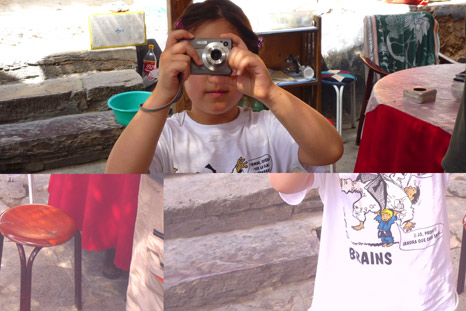


gifting
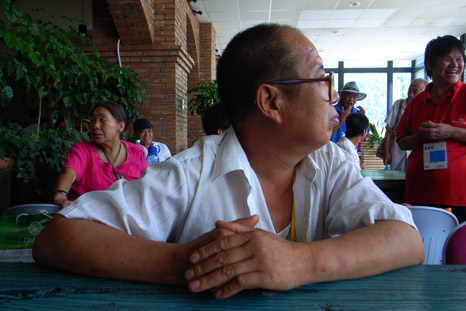
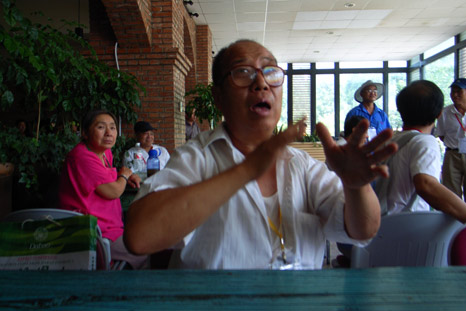
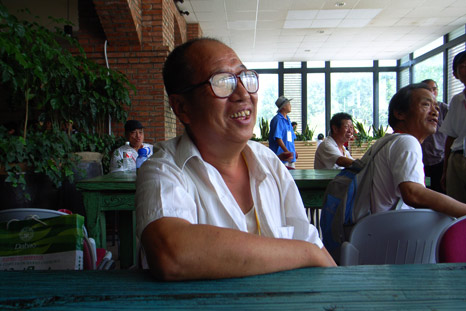
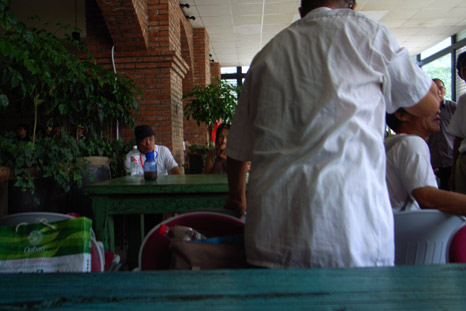
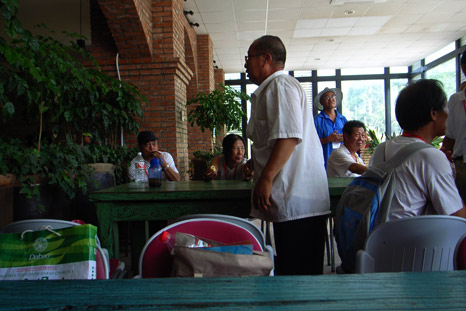
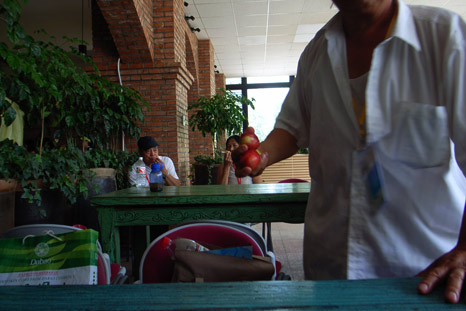
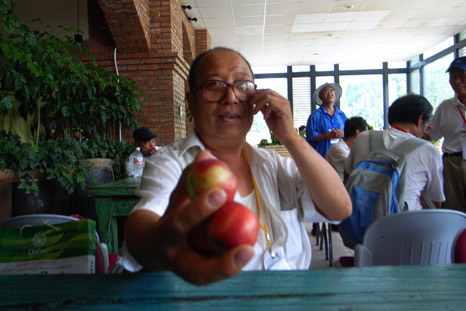
what is communication, what is imperial, what is revolutionary, what is natural? Posted by 丫 | reply »
